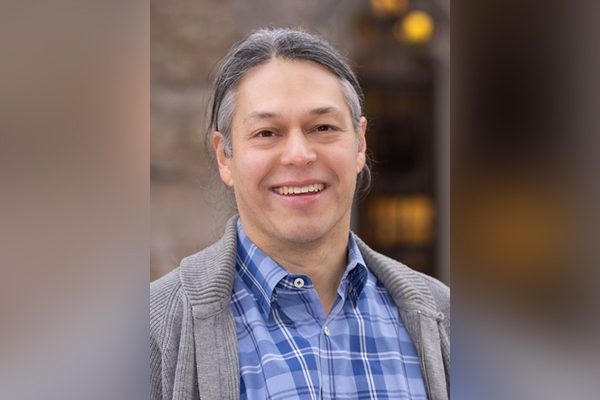Yale history professor set to publish highly anticipated book on indigenous history
Ned Blackhawk’s book “The Rediscovery of America” seeks to redefine our understanding of native history.

Yale News
History professor Ned Blackhawk’s forthcoming book “The Rediscovery of America: Native Peoples and the Unmaking of US History” landed on the Washington Post’s 2023 reading list at the start of this year.
The book, which is slated to be released on April 25, conducts a sweeping reexamination of Indigenous history across five centuries, drawing attention to the ways in which native groups formatively influenced modern-day America. Blackhawk’s comprehensive literature review places Indigenous peoples at the center of the nation’s historical understanding.
“This book is, in many ways, something that I’ve been thinking about [and] living with for quite some time,” Blackhawk told the News.
The book’s inspiration came decades ago, he explained, after he realized how little most American historical scholarship actually recognized the contributions of Indigenous people.
Drawing on 25 years of findings, Blackhawk hopes the work will inform its readers of the fundamental importance of Native groups to the history of the country.
“The Native peoples, across much of American history, not just responded to … European imperialism and colonialism, but … fundamentally … reconstituted those forms,” Blackhawk remarked.
This kind of determinative influence could be seen, as Blackhawk wrote in his book, in the role Native peoples played in the Seven Years’ War and the colonial settler militias that eventually fought in the Revolutionary War. The work’s broad tapestry of sources and time periods makes it one of a kind.
“There are too few scholarly synthetic overviews of Native American history at a continental scale written by Indigenous authors,” Tiffany Hale PhD ’17, an assistant professor of religion at Barnard College, wrote to the News. “This is something that we have needed for a long time as researchers and teachers.”
Mark Peterson, professor of early American history, told the News that Blackhawk’s book portrays how “varied and complicated” the world of Indigenous Americans was before European colonization. Peterson added that Blackhawk depicts how crucial Indigenous Americans’ efforts were to the survival of European settlers.
Meghanlata Gupta ’21 YLS ’25, citizen of the Sault Ste. Marie Tribe of Chippewa Indians, helped as a research assistant for the book, studying federal tribal land laws and indexing modern-day tribes. At Yale, she took three of Blackhawk’s classes.
“This book is doing something so unique and important … I mean, it’s hundreds of years of history that he’s telling,” Gupta said. “It’s … a very complex, comprehensive story that pushes back against stereotypes about Native Americans [and] the false narratives that have been told for way too long. And it also provides a great … teaching resource for anyone who’s interested in learning about these histories.”
While “Rediscovering America” is not his first book — other works include “Violence Over the Land” and research into urban relocation of Native peoples — Blackhawk said that it was a project unlike any other. He noted that the work takes a more holistic approach to Indigenous history and consciously attempts to offer “interpretive conclusions about larger subjects” rather than focusing on a specific time period.
The book begins with Native society centuries before the arrival of European settlers and covers developments up to the present day.
What ultimately separates the book from other recently published scholarly works is the personal self-reflection that Blackhawk includes. In both its introduction and conclusion, Blackhawk meditates on the impact of Native history’s intergenerational legacies on his own life, wondering when America will reckon with the violence it has wrought.
“That question is one that makes [the book] not only a scholarly endeavor, but a personal endeavor, an emotional endeavor, and a political endeavor,” said Khalil Johnson PhD ’16, assistant professor of African American studies at Wesleyan University.
Johnson, who previously worked with Blackhawk when he was a graduate student at Yale, compared the narrative and transformative insight of Blackhawk’s first book to The New York Times’ The 1619 Project — a series investigating the legacies of American slavery.
Blackhawk’s book also reflects his efforts to increase intellectual diversity in Yale’s own halls. During graduate school, Johnson recalled that Blackhawk had petitioned the University to hire more Indigenous scholars. Blackhawk now co-edits the Henry Roe Cloud Series on American Indians and Modernity, a book series that supports graduate students to pursue their research into Indigenous studies.
“[Blackhawk] has been really trying to make institutional change across academia and to a broader purpose across culture that will … enhance the voice and centrality of Native and Indigenous peoples across all fields,” Johnson said.
Blackhawk acknowledged the importance of Yale’s Native student community to his project. Since first joining the University in 2009, Blackhawk said that many of the Native students he has worked with through the Native American Cultural Center have inspired and supported a “whole range of initiatives that have been really important in my overall academic thinking and engagement.”
“He’s been thinking about this for a while now [and] it’s going to be a huge hit when it comes out. And I’m just so excited for it,” Gupta said.
Blackhawk is currently teaching his upcoming book in his spring undergraduate history course, “Introduction to American Indian History.”
Correction 1/26: A previous version of this article misstated Johnson’s graduation year, and gave an inaccurate description of the Henry Roe Cloud Series on American Indians and Modernity.







